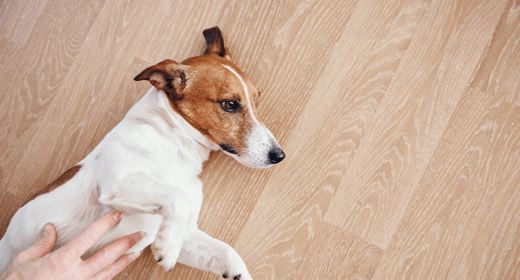

Bloat can affect any dog; however, it is observed in deep-chested, larger breeds more frequently than in others. Unfortunately, you will find that many dog owners are completely unaware of this ailment until it starts to endanger their pet’s life. Therefore, all pet owners should be aware of bloat and how to spot and respond to symptoms of bloat in dogs. So, here is all you need to know about dog bloat.
Bloat can affect any dog; however, it is observed in deep-chested, larger breeds more frequently than in others. Unfortunately, you will find that many dog owners are completely unaware of this ailment until it starts to endanger their pet’s life. Therefore, all pet owners should be aware of bloat and how to spot and respond to symptoms of bloat in dogs. So, here’s all you need to know about bloating in dogs.
Bloat is a life-threatening condition that acts rapidly and can lead to death within hours if not recognized and treated immediately. Unfortunately, the cause of bloat remains unknown at this time.
The scientific term for bloat is gastric dilatation-volvulus or GDV. Bloat is characterized by rapid and abnormal expansion of the stomach with gas (dilatation). This can be followed by rotation of the stomach (volvulus). This rotation closes both the entry to and exit from the stomach. The blood vessels also are closed, and the blood flow is restricted.
What follows is an increase in pressure inside the stomach and compression of the surrounding organs. Eventually, shock will occur as a result of the restricted blood flow. Here are a few key facts about bloat:
Bloat is a true medical emergency, and early identification and treatment is critical for survival.
In the early stages of bloat, the dog will be very uncomfortable. You might see it pacing and whining or trying unsuccessfully to get into a comfortable position. It might seem anxious, might lick, or keep staring at its stomach, and might attempt to vomit, without success.
Other indications of bloat can include weakness, swollen abdomen, and even signs of shock. Signs of shock are increased heart rate and abnormally rapid breathing.
If you notice these signs of bloat in dogs, call your veterinarian immediately!
This occurs due to gas getting trapped in the stomach region.
Gastrointestinal problems in dogs can cause excessive salivation, including esophageal diseases like megaesophagus.
Pacing and restlessness are typical signs of bloating. Your dog may even groan or whine when you press on their belly.
An abnormal swelling due to gas in your dog’s stomach can also cause respiratory distress along with a twisted belly.
Bloating can put strain on the diaphragm, a delicate muscle that divides the chest from the abdomen. This ends up making heartbeats shorter and breathing difficult.
Although veterinarians don't know what causes bloat in dogs, there are numerous factors that increase a dog's risk for this condition. These include:
These suggestions could help in preventing bloat in dogs. However, they are based on suspected risk factors and are not guaranteed to prevent the onset of bloat.
All cases of bloat in dogs require prompt medical intervention. The condition can be treated if it gets addressed quickly. In case of a simple bloat, where the dog's stomach has not twisted, the pet may be treated without any medication. They may be given fluids and certain therapies. If discovered in its early stages, other types of bloats such as GDV, may also be treatable. Surgical intervention may also be used for treatment in certain cases.
Releasing the trapped air and gas will relieve pressure on the surrounding organs and prevent the stomach's tissue from degenerating. A tube and stomach pump can be used for this; however, surgery may be required on occasion. This can aid in stomach unwinding or curing GDV in dogs.
Additionally, electrolyte-fortified intravenous fluids are also administered to improve blood flow to vital organs. In many cases, this necessitates the use of potent painkillers, antibiotics, and medications to treat the decreased blood supply to the heart due to bloating.
As soon as the dog is steady, surgery is carried out. Your veterinarian may need to untwist the dog's stomach and remove any stomach wall tissue that might have died from a lack of blood supply. The veterinarian will also perform a treatment known as a gastropexy to suture the stomach to the body wall. As a result, the likelihood of the stomach rotating in the future decreases significantly; thus, preventing bloat in dogs.
Another way you might help prevent bloat is by feed a high-quality, easily digestible food with normal fiber levels.
Feeding management offers the best method available for reducing risk until the exact cause of bloat can be identified. Although not 100% effective, these measures can reduce the number of dogs that face this serious, life-threatening condition.
IAMS™ dog food stands out as a superior and highly digestible choice for your furry companion.
If you're looking for the perfect dog for you, try our Dog Breed Selector today and enjoy a lifetime of tail-wagging joy.
You can help a dog with a bloated stomach by administering intravenous fluids with electrolytes and pain relievers. This will lessen their pain and shock and possibly even protect important tissues from dying due to the loss of blood flow.
Your dog’s belly may appear bloated due to gas being trapped in the stomach region. This may result in abdomen enlargement, thus blocking blood flow and impeding digestion.
Dog bloat, also known as simple bloat, often happens and gets better on its own. Bloat without twisting can still be fatal, but the risk depends on how severe the condition is and how long it lasts.
Bloat usually occurs quickly and without any warning. A dog may pace, pant, drool, or even try to vomit without being able to throw up. Other typical symptoms include anxiety and stomach discomfort. In extreme circumstances, dogs could pass out, have an accelerated heart rate, or even exhibit pale gums.
Food bloat in dogs usually does not last beyond 24 hours with vigorous hydration therapy and supportive care. However, be sure to take necessary precautions to prevent your dog from getting unauthorized food sources, and exercise caution the next time your pet overeats.


Welcome to our pet care blog, where we delve into the intricacies of fostering the well-being of our four-legged friends. In this edition, we shine a spotlight on a fundamental aspect of puppy care—nutrition. As conscientious pet owners, understanding the role of vitamins in the early stages of a puppy's life is essential for promoting robust health and vitality. In this blog, we study the key nutrients that contribute to the overall development of our furry companions.
During the crucial phases of growth and development, puppies have distinct nutritional needs, and vitamins play a pivotal role in ensuring they thrive. If you are looking for vitamins for puppies in the Philippines, IAMS has you covered with some of the best puppy vitamins in their range of dog supplements.
From supporting bone formation to bolstering their immune systems, each puppy multivitamin contributes uniquely to a puppy’s well-being. A well-balanced diet is paramount for setting the stage for a lifetime of happiness and vitality. Next, let us uncover the essential components that will help you make informed choices to ensure your puppy receives the nutrients necessary for a healthy and vibrant start to life.
Puppy vitamins are essential for the health and development of puppies, just as they are for humans. While a balanced diet is crucial, factors such as rapid growth and specific life stages may necessitate additional vitamin support. In the following section, we will explore the importance of vitamins tailored to the unique needs of puppies, examining how these nutrients contribute to their overall well-being. Understanding the role of vitamins in a puppy's diet can guide pet owners in providing the best possible start for their young companions.
Ensuring your puppy gets the right vitamins is not just about being a nutrition expert, it is about setting the stage for a life filled with tail wags and playful antics. From bone development to a glossy coat, these little powerhouses contribute to your pup's well-being in a big way. Below is a break down the perks with a quick list of pointers that highlight how vitamins can make your puppy's world a whole lot brighter:
Essential vitamins, such as vitamin D and calcium, play a pivotal role in bone development, ensuring that puppies develop strong and healthy skeletal structures during their rapid growth phases. Proper bone formation not only supports their current well-being but lays the groundwork for a lifetime of agility and mobility.
Vitamins like vitamin C and vitamin E contribute to a robust immune system, helping puppies defend against infections and illnesses as they encounter new environments and experiences. A strengthened immune system provides a crucial defense mechanism, aiding in the puppy's ability to adapt and thrive.
B vitamins, particularly B12 and folate, are crucial for neurological development. These vitamins support cognitive function, aiding in the formation of a puppy's developing brain and nervous system. An enriched cognitive foundation sets the stage for improved learning, memory, and overall mental acuity.
Vitamins A and E are essential for maintaining healthy skin and a glossy coat. These vitamins contribute to skin cell integrity and help prevent issues such as dryness and flakiness. A radiant coat not only enhances a puppy's appearance but is indicative of their overall health.
B-complex vitamins, including B1, B2, and B6, are vital for energy metabolism. They help convert food into energy, ensuring that puppies have the stamina and vitality needed for their playful and active lifestyles. A well-regulated energy metabolism supports sustained playfulness and optimal physical activity levels.
Vitamins A and C are critical for maintaining good eyesight. The best puppy vitamins contribute to the health of the eyes and can prevent issues related to vision as puppies grow. Clear and healthy vision is essential for puppies as they explore their surroundings, promoting confidence and safety in their environment.
Adequate vitamin intake supports the overall health and vitality of puppies, promoting a strong foundation for a lifetime of well-being. A balanced vitamin profile ensures that puppies can thrive and enjoy a high quality of life from their early stages onward, setting the stage for a happy and healthy companionship.
Puppy vitamins are like the superheroes of a puppy's well-being. From building strong bones to giving their immune system a boost, these little nutrients play a big role in keeping our furballs healthy and happy.
So, the next time you are picking up doggy treats or deciding on their dinner, remember the power of those vitamins, because a well-fed puppy is a puppy ready for all the belly rubs and adventures you can throw its way.